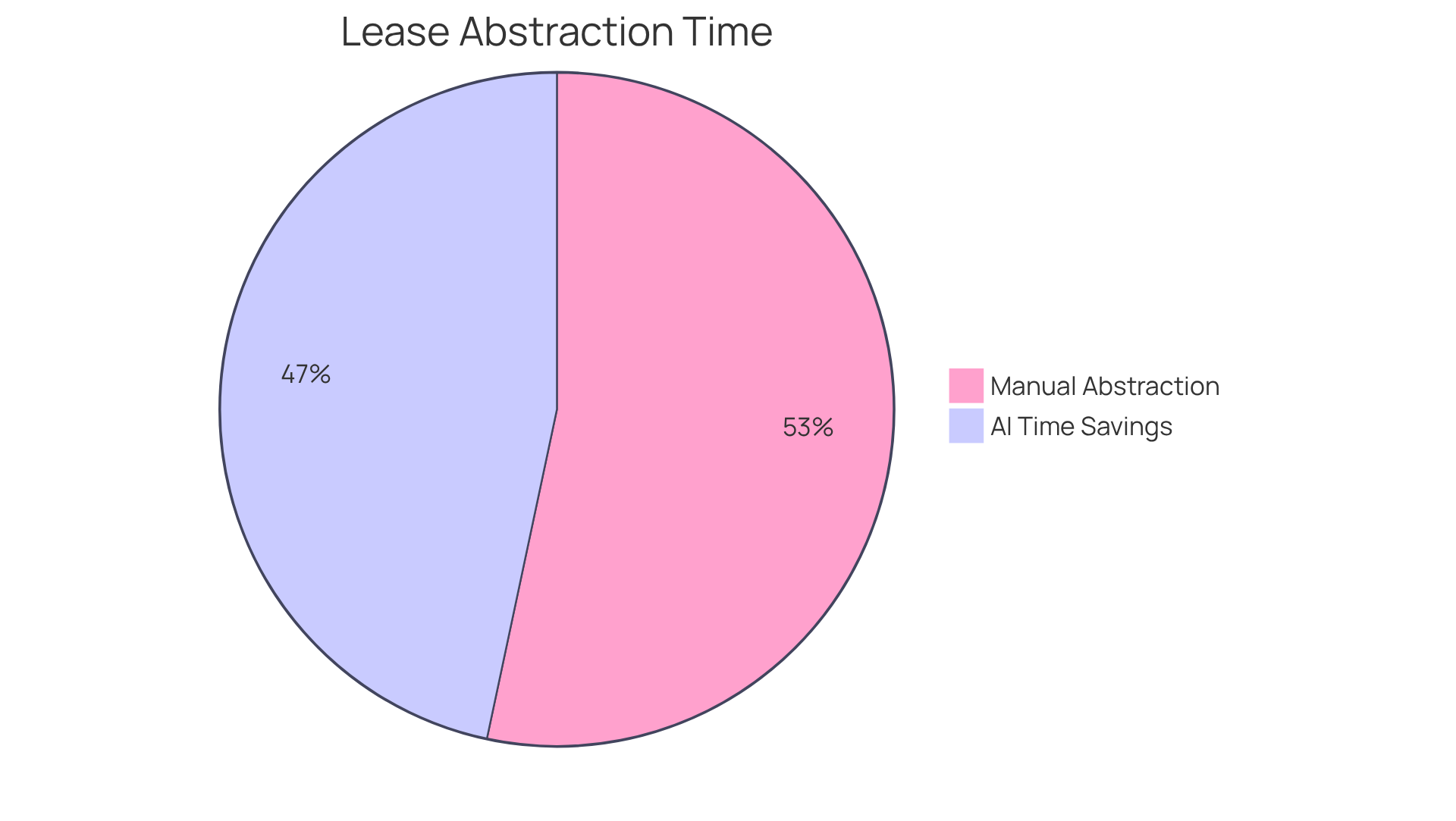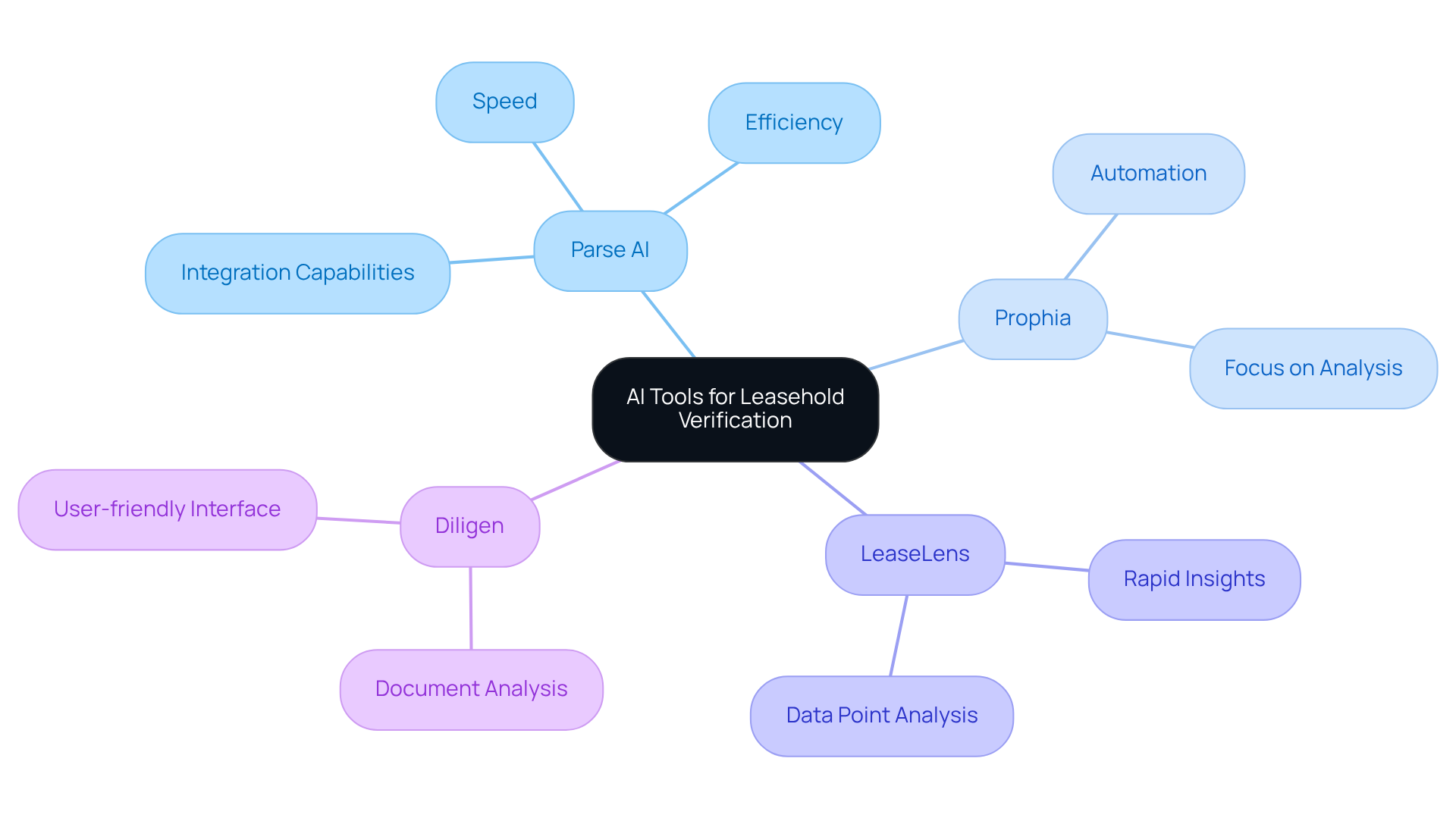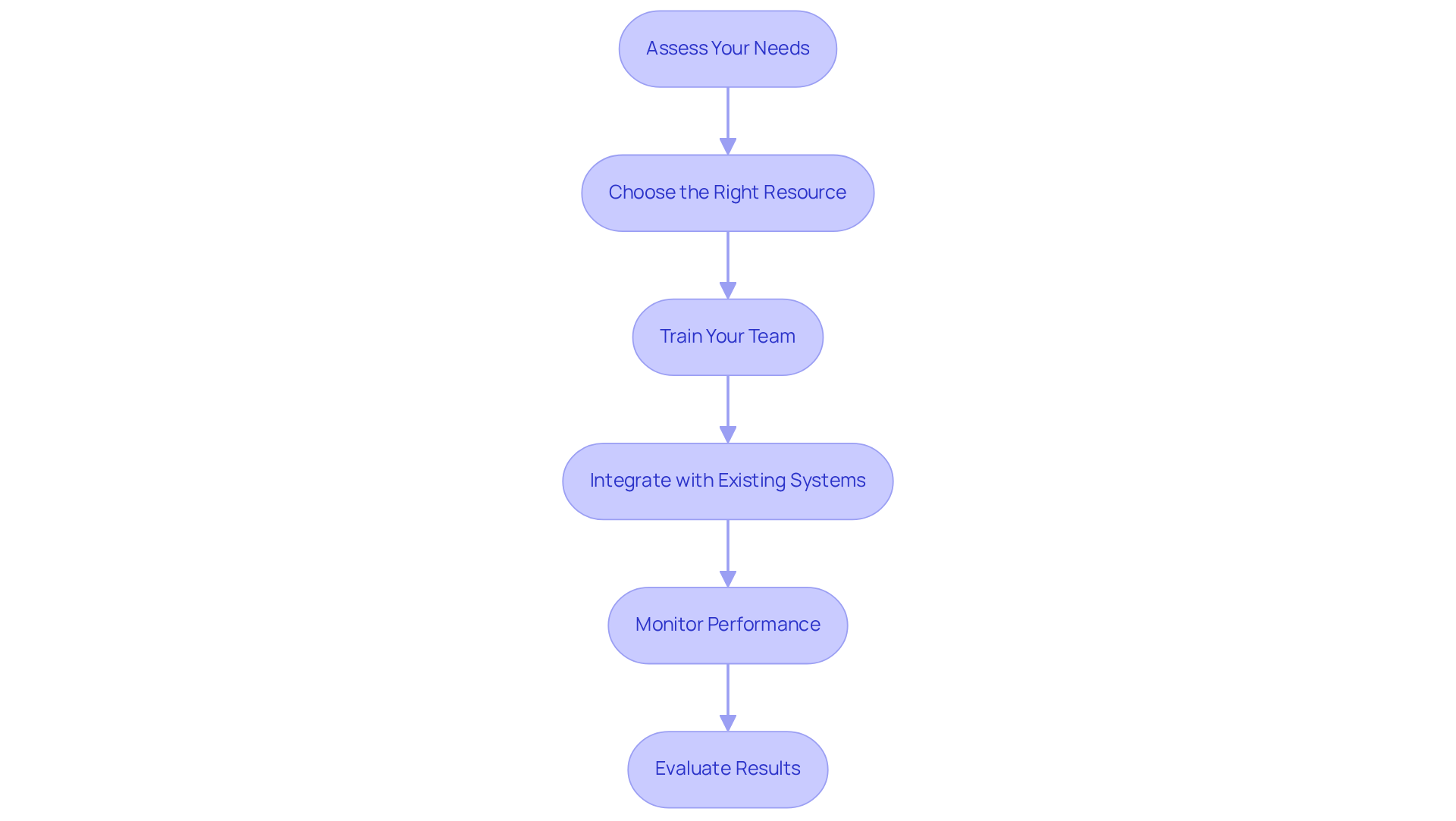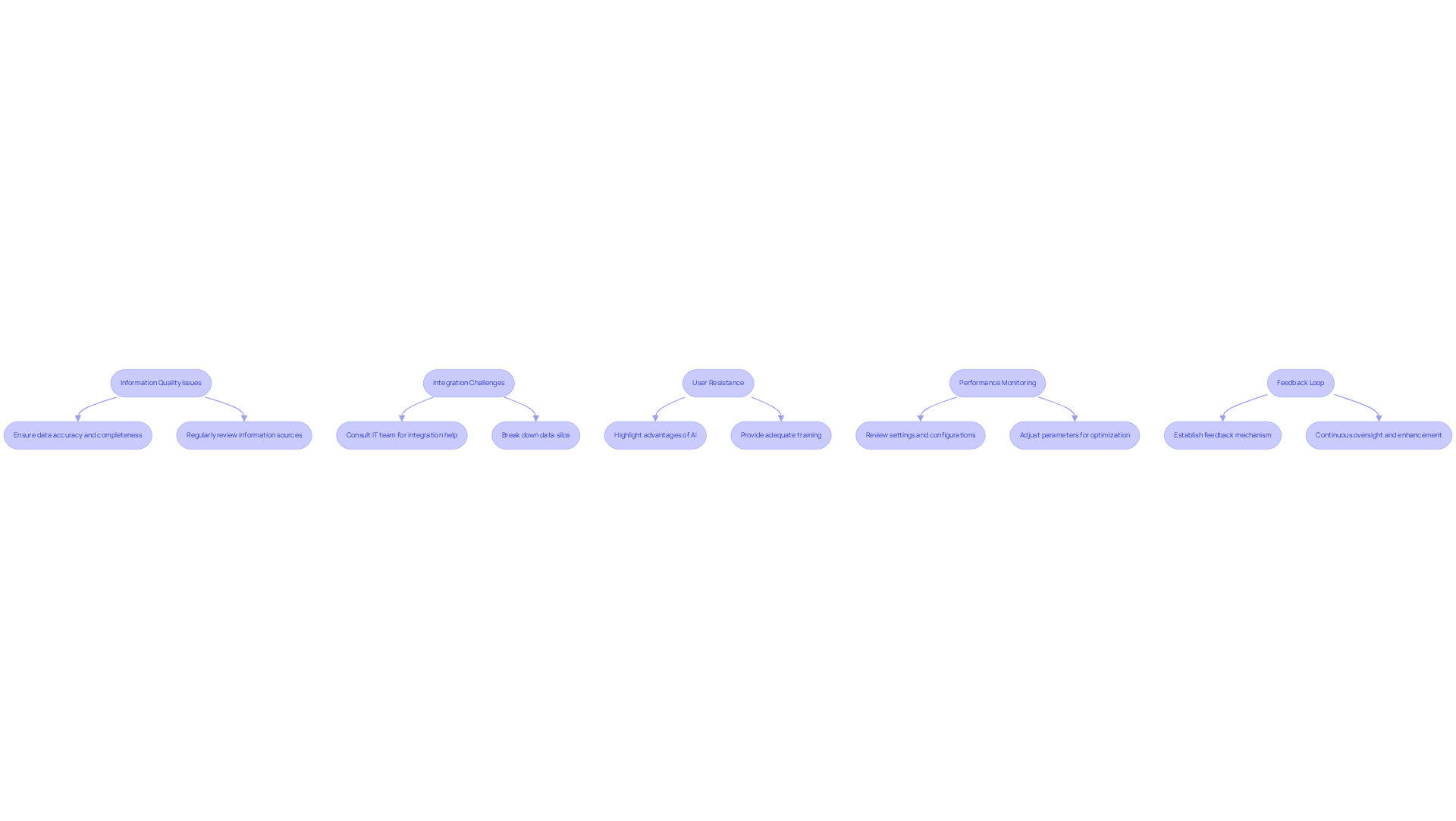Overview
AI tools for leasehold verification play a crucial role in streamlining the process by automating the extraction of information from complex lease documents. This innovation significantly reduces the time required for title research while enhancing accuracy. Notably, tools like Parse AI can cut processing time by up to 90%. Such statistics demonstrate the transformative potential of AI in improving operational efficiency and decision-making within the real estate sector.
Introduction
The landscape of real estate is evolving rapidly, propelled by the integration of artificial intelligence into leasehold verification processes. As professionals navigate the complexities of lease documents, AI tools are emerging as transformative solutions, enhancing efficiency and accuracy while significantly reducing the time spent on manual tasks.
However, with an abundance of options available, determining which AI solutions will truly streamline workflow and deliver optimal results becomes crucial.
This article explores four standout AI tools that are revolutionizing leasehold verification, examining their unique features and outlining practical steps for successful implementation.
Understand the Role of AI in Leasehold Verification
AI tools for leasehold verification, particularly machine learning and optical character recognition, are revolutionizing leasehold authentication by automating the extraction of information from complex lease documents. These advanced tools swiftly analyze vast datasets, identifying key terms and conditions that would otherwise consume significantly more time for human researchers. By leveraging AI, real estate professionals can enhance accuracy, minimize human error, and streamline workflows, resulting in expedited decision-making and improved compliance with legal standards.
Notably, manual lease abstraction can occupy up to 80% of an analyst's time, making the efficiency gains from AI adoption not just beneficial but essential. Furthermore, as of 2023, 58% of real estate professionals are already utilizing PropTech solutions, highlighting the urgent need to embrace these innovations. AI has the potential to reduce lease abstraction time by as much as 70%, as emphasized by Imprima, highlighting the strategic necessity of using AI tools for leasehold verification in leasehold assessments. Understanding these capabilities is vital for experts seeking to modernize their assessment processes and maintain a competitive edge in the real estate market.

Explore AI Tools for Title Research and Leasehold Verification
Several AI tools for leasehold verification currently lead the market, underscoring the significance of accurate title research in the real estate sector. Here are four notable options:
-
Parse AI: This platform excels in extracting essential information from title documents through advanced machine learning algorithms and Optical Character Recognition (OCR). By using AI tools for leasehold verification to process and abstract leases in as little as 7 minutes—compared to the traditional 3-5 hours—Parse AI significantly reduces the time required for title research, achieving a remarkable 70-90% reduction in processing time. This efficiency makes it ideal for real estate professionals seeking accuracy and speed in their workflows. Furthermore, Parse AI's integration capabilities with existing systems streamline operations, which is crucial for utilizing AI tools for leasehold verification and enhancing overall productivity.
-
Prophia: Renowned for its AI tools for leasehold verification, Prophia automates the extraction and organization of critical lease information. Consequently, this enables users to concentrate on analysis instead of information input, thus boosting productivity and decision-making.
-
LeaseLens: This tool highlights speed and precision in lease information extraction, allowing users to obtain rapid insights into lease terms and conditions. Its capability to analyze thousands of data points in seconds is essential for prompt decision-making in fast-paced real estate settings.
-
Diligen: Diligen offers robust document analysis features, allowing users to efficiently compare lease agreements and identify discrepancies. Its user-friendly interface makes it accessible for professionals at all levels, consequently enhancing the review experience.
By examining these resources, real estate experts can discover solutions that best align with their workflows and enhance their leasehold assessments through AI tools for leasehold verification. Ultimately, this results in increased operational efficiency and lowered expenses. As Satya Nadella stated, 'The future of AI is not about replacing humans, it's about augmenting human capabilities,' which underscores the transformative potential of these technologies in the real estate sector.

Implement AI Tools in Your Leasehold Verification Process
To effectively implement AI tools in your leasehold verification process, follow these steps:
-
Assess Your Needs: Identify specific challenges in leasehold verification and determine which aspects could benefit most from automation.
-
Choose the Right Resource: Select an AI resource that aligns with your objectives, considering ease of use, integration capabilities, and customer support.
-
Train Your Team: Provide comprehensive training sessions and resources to ensure your team is familiar with the software's features and functionalities. On average, training teams on new AI resources can take several weeks, depending on the complexity of the software and the team's prior experience with similar technologies.
-
Integrate with Existing Systems: Collaborate with your IT department to merge the AI application with current systems, which may involve data migration and ensuring compatibility with existing software.
-
Monitor Performance: Continuously assess the system's performance post-implementation. Gather user feedback and make necessary adjustments to optimize its use.
-
Evaluate Results: Regularly assess the AI system's impact on your leasehold confirmation method, focusing on enhancements in efficiency, accuracy, and overall workflow to validate the investment.
By following these steps, you can successfully incorporate AI tools for leasehold verification into your process, significantly improving operational efficiency. Furthermore, consider that automation in the real estate sector can lead to a potential 34% increase in operating cash flow, underscoring the financial benefits of adopting AI tools. Ensure adherence to privacy regulations such as GDPR or CCPA to avoid legal issues during implementation.

Troubleshoot Common Issues in AI-Driven Leasehold Verification
When implementing AI tools for leasehold verification, it is essential to recognize and address several common issues to ensure a successful integration. Here’s how to troubleshoot them:
-
Information Quality Issues: Ensure the accuracy and completeness of the information being fed into the AI system. Incomplete or inconsistent data can lead to erroneous outputs, resulting in U.S. companies losing approximately $3.1 trillion each year due to poor quality. Regularly review your information sources to maintain high standards and mitigate financial risks.
-
Integration Challenges: If the AI application does not integrate seamlessly with your existing systems, consult your IT team or the application’s support service for assistance. Furthermore, breaking down data silos is crucial; fragmented data complicates effective model training and integration.
-
User Resistance: Team members may exhibit hesitance towards adopting new technology. Address their concerns by highlighting the advantages of AI resources and providing adequate training to instill confidence. It is also vital to secure top-level buy-in and commitment to ongoing refinement, fostering a culture of acceptance.
-
Performance Monitoring: If the AI tool underperforms, review its settings and configurations. Ensure it is appropriately trained on your specific datasets, which should be statistically representative of real-world distributions. Adjust parameters as necessary to optimize performance.
-
Feedback Loop: Establish a feedback mechanism for users to report issues and suggest improvements. This approach will help identify recurring problems and facilitate proactive resolutions. Continuous oversight and enhancement of data-related procedures are crucial for ensuring the efficiency of your AI system.
By being aware of these common issues and knowing how to troubleshoot them, you can facilitate a smoother implementation of AI tools for leasehold verification in your process.

Conclusion
Embracing AI tools for leasehold verification is no longer merely an option; it has become an essential requirement for real estate professionals striving to enhance operational efficiency and accuracy. By automating the laborious process of lease abstraction, these innovative technologies not only save valuable time but also significantly mitigate the risk of human error. The integration of AI into leasehold verification processes represents a strategic maneuver that positions organizations to remain competitive in an increasingly fast-paced market.
Throughout this article, critical insights have been shared regarding the role of AI in this domain, including an exploration of leading tools such as Parse AI, Prophia, LeaseLens, and Diligen. Each of these platforms presents unique features that streamline the verification process—from rapid data extraction to comprehensive document analysis. By implementing these tools, real estate professionals can anticipate a remarkable reduction in processing times and an overall enhancement in their workflow, ultimately leading to improved compliance and decision-making.
The potential impact of adopting AI in leasehold verification transcends mere efficiency gains. As the industry continues to evolve, embracing these advanced technologies can yield substantial financial benefits, including increased operating cash flow. It is imperative for professionals not only to adopt these tools but also to foster a culture of innovation and continuous improvement within their organizations. Taking proactive steps to integrate AI effectively will pave the way for a more streamlined, accurate, and successful leasehold verification process, thereby ensuring a competitive edge in the real estate landscape.
Frequently Asked Questions
What is the role of AI in leasehold verification?
AI tools, particularly machine learning and optical character recognition, automate the extraction of information from complex lease documents, enhancing accuracy and streamlining workflows in leasehold authentication.
How do AI tools improve the leasehold verification process?
AI tools swiftly analyze vast datasets, identifying key terms and conditions, which significantly reduces the time and effort required for human researchers, thus expediting decision-making and improving compliance with legal standards.
How much time does manual lease abstraction typically consume?
Manual lease abstraction can occupy up to 80% of an analyst's time.
What efficiency gains can be achieved by adopting AI in leasehold verification?
AI has the potential to reduce lease abstraction time by as much as 70%, making its adoption essential for improving efficiency in leasehold assessments.
What percentage of real estate professionals are using PropTech solutions as of 2023?
As of 2023, 58% of real estate professionals are utilizing PropTech solutions.
Why is understanding AI capabilities important for real estate experts?
Understanding AI capabilities is vital for real estate experts seeking to modernize their assessment processes and maintain a competitive edge in the market.




